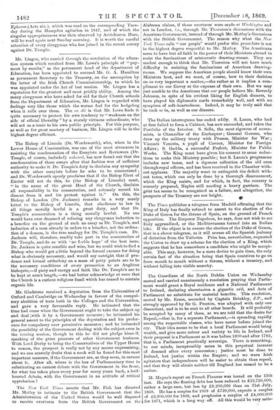The Bishop of Lincoln (Dr. Wordsworth), who, when in the
Lower House of Convocation, was one of the most strenuous in resisting the condemnation of the Essayists and Reviewers (Dr. Temple, of course, included) unheard, has now found out that the condemnation of those essays after that fashion was of sufficient authority to make it Dr. Temple's duty to disclaim any sympathy with the other essayists before he asks to be consecrated ; and Dr. Wordsworth openly proclaims that if the Bishop Elect of Exeter will not do this, he (the Bishop of Lincoln) must, " in the name of the great Head of the Church, disclaim all responsibility in his consecration, and solemnly record his dissent from it and his protest against it." On this, the Bishop of London (Dr. Jackson) remarks in a very manly letter to the Bishop of Lincoln, that obedience to law in all things morally lawful is a great duty, and that Dr. Temple's consecration is a thing morally lawful. No one would have ever dreamed of refusing any clergyman induction to a benefice on the ground of such an essay as Dr. Temple's, and induction of a man already in orders to a benefice, not the ordina- tion of a deacon, is the true analogy for Dr. Temple's case. Dr. Jackson will, therefore, readily take part in the consecration of Dr/remple, and do so with ' no feeble hope' of the best issue. Dr. Jackson is quite sensible and wise, but we could wish to find a Bishop who would get a little beyond the formal excuses for doing what is obviously necessary, and would say outright that if pru- dence and formal orthodoxy on a mass of petty points are to be the necessary conditions of every promotion to an Anglican bishopric,—if piety and energy and faith like Dr. Temple's are to be kept at arm's length,.—we had better acknowledge at once that the Church is a curious religious fossil which has ceased to contain organic life.






































 Previous page
Previous page